How to Switch to Natural Skincare
Switching to natural skincare products can be fun, trust me. You don’t have to make it a ‘now’ thing, you’ll be trying new ingredients, lines and products for the rest of your life (particularly as green beauty is really taking off and there’s so many new ingredients available in the market).
The switch might possibly take some time so: take it easy, enjoy the process and learn as you go. That’s my advice.
- From Conventional Skincare to Natural/Organic Skincare
- “Natural” Label Doesn’t Always Mean Chemical-Free
- About Preservatives (Product Shelf-Life)
- Organic Skincare vs Natural Skincare
- Natural Ingredients WORK
- More & More Popular
- An Overall Sense of ‘Wellbeing’, a Lifestyle & a Catalyst for Many Other ‘Natural’ Changes in Your Life
- WHY You Should Switch to Natural Skincare Products
- 1. Natural ingredients are just as effective as conventional skincare
- 2. You’re Responsible for Our Environment
- 3. Save Animals Lives
- HOW You Can Switch to Natural Skincare Products
- 1. Do Your Research Thoroughly and DON’T Buy on Impulse
- 2. Start with a Brand You Know and/or Trust
- 3. Be Patient: How About Trying One Product at a Time?
- 4. In the Meantime: Learn to Read (and Understand) the Label
- Re-Train Your Mind Regarding Packaging
- Ok, I’ve Switched, How Fast Will it Work?
- Helpful Links & Resources
From Conventional Skincare to Natural/Organic Skincare
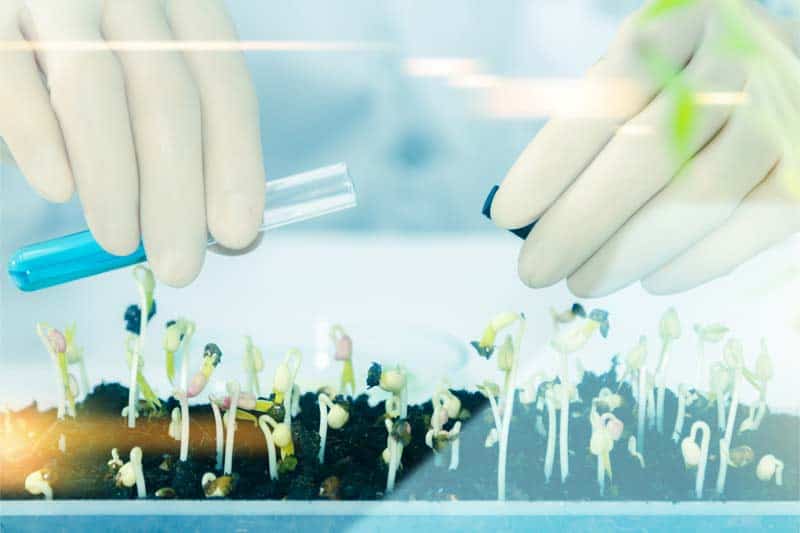
If you’ve been using ‘traditional’ or ‘conventional’ skincare and now are wondering how to make the switch to a more natural skincare line (or maybe even 100% natural, organic and wonderfully green product line) I hear you.
I was once where you are right now. I simply knew I wouldn’t be able to go on using conventional skincare because it didn’t feel coherent with the new lifestyle I was also slowly getting into.
I couldn’t switch from one day to the next; not because of lack of willingness or simply laziness, but because of the following (you might identify with one/more of the below):
- Will it be as efficient?
- Which brand(s) can I trust?
- Which line(s) are best for me?
- What sort of budget can get me what I need?
- Who can help me in terms of what to switch to?
- Are the natural/organic product ‘counterparts’ the same as conventional skincare products or would my routine have to somehow change? (do check my post on Do Anti Aging Creams Work?).
And so on…
Believe me, I know that switching is not as easy as 1,2, 3.
You probably have more questions than answers so, again, I do hear you.
“Natural” Label Doesn’t Always Mean Chemical-Free
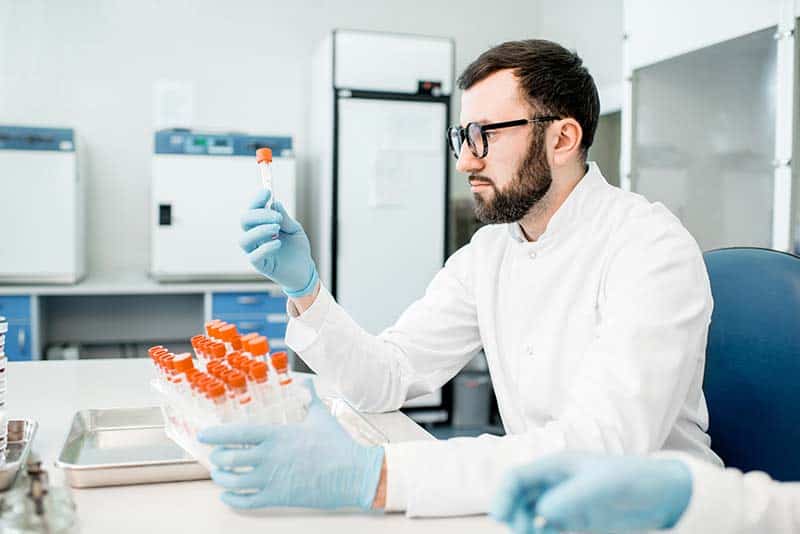
By the way, to the above you have to add that natural/organic does not always mean chemical-free! This is why it is important that you learn about ingredients (yes, it might take a little time, but, before you know it, you’ll be a pro).
It is important to understand that the word ‘natural’ means different things to different people (for example, some ingredients have to undergo a degree of synthesis in the lab which might still be considered natural, i.e. Tocopherol [Vitamin E] – do check out this great podcast from Formula Botanica on What Does Natural Skincare Mean?)
Then there’s also ‘naturally derived’, a natural to synthetic spectrum, the definition ‘nature identical’, etc, etc, etc til we arrive at ‘synthetic’.
I don’t want to further confuse you and make the switch more complicated. What I’m saying here is that ‘natural’ doesn’t fit one system and you’ll have to find out what natural means to you.
Some people will only want to use only what I call ‘kitchen skincare’ (i.e. coconut oil as make up remover, apple cider vinegar and water as your toner, orange juice for the vitamin C as your natural AHA, oats as part of a face mask, honey as a natural humectant, coffee grounds for a body scrub, cucumber slices for eye puffiness, brown sugar to scrub your lips and so on.
Others will use only organic/vegan/clean skincare that they feel has the power of nature in them but have been created/processed in a lab (a moisturiser is a mix of water and oil which means it has to be mixed with an emulsifier in order for it both elements to ‘stick together’). There are many, many, many brands to adhere to strict ‘natural’ and/or ‘organic’ brand ethos and I particularly love them, although I don’t think it is always necessary to never use products from companies outside of these ones.
Then you have brands that will use certain ingredients that are frowned upon some people in the ‘clean beauty’ industry but that you might be ok with. For example, when it comes to preservatives there’s a whole spectrum of opinions and ideas surrounding them and you’ll have to find something that you feel comfortable with.
Finally, you’ll need to learn the difference between ‘natural’ (an orange is natural and a product using vitamin C can also be considered natural) vs organic (oranges that come from organic farming and have to adhere to organic certification).
So, you could be using coconut oil for cleansing that is natural but not organic (without the ‘organic’ certification) but you could also be applying on a cream that has been certified as organic (most of the ingredients used in the product are organic but the product in itself doesn’t feel natural to you because it uses a preservative you don’t agree with).
You get me?
The point is that YOU MUST FIND OUT WHAT NATURAL means to you and purchase your skincare accordingly.
This will take time and you will redefine ‘natural’ in your vocabulary many times in the next years.
And that is totally fine.
Let’s first tackle WHY you should switch to natural skincare products and then we’ll tackle HOW you can go about this.
About Preservatives (Product Shelf-Life)
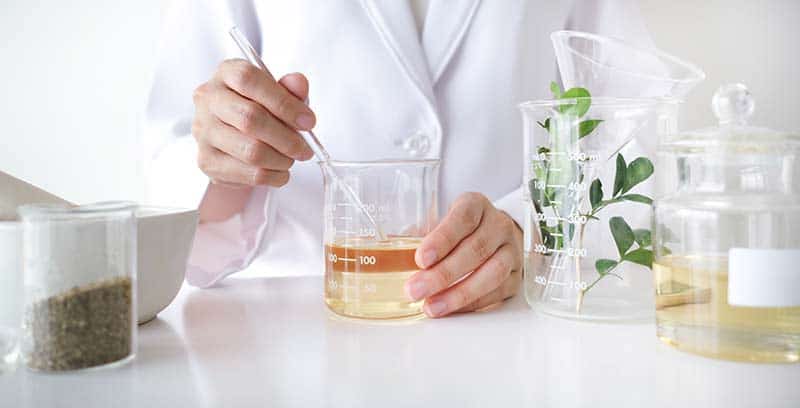
Preservatives are necessary if we want products to last longer than a few days.
Obviously, we do.
There’s a whole debate around preservatives; but before I discuss this section let me tell you there’s no such thing as prerservative free skincare.
The only way you can enjoy a preservative free moisturiser is if you apply an oil to your skin. Or use cucumber slices as a toner. And so on (you get my drift).
If it comes in a package and you’ve bought it in a store it will have some form of preservation system.
Let’s recall why skincare needs to be preserved:
- Skincare is susceptible to microbial growth (high water content, clays, hydrosols, gums, humidity, pH below 7… all these contribute to microbial growth)
- An opened product is susceptible to contamination (the moment you open that jar)
- Preservatives protect the product and you
You might not be happy using products that contain parabens as part of their preservative system because of the bad rap they get or because of your own personal ethos or because you think there are other more natural choices you’re happy to explore. No doubt that broad spectrum preservatives like Geogard ECT (Benzyl Alcohol, Salicylic Acid, Glycerin and Sorbic Acid) Geogard 221 (Cosgard) (Benzyl Alcohol and Dehydroacetic Acid) and Naticide or Plantaserve Q are known natural preservatives (check this article by School of Natural Skincare. Also here’s a great article on preservatives that is particularly thorough with great info! Please note that a preservative like Phenoxyethanol is considered to be natural although is very much frowned upon by the green beauty community. So, you’ll have to do your research).
What can I say. I wish I could give you a straight answer here on what’s a natural preservative, what’s a preservative you should be aware of and how can you apply skincare that is preservative-free (again, not possible if buying from a shop) so please do your research and learn what’s best for you. Here’s a list of natural preservatives that will help you at least get acquainted with them.
**As a side note, products that contain no water don’t need a preservative (i.e. coconut oil).
Organic Skincare vs Natural Skincare
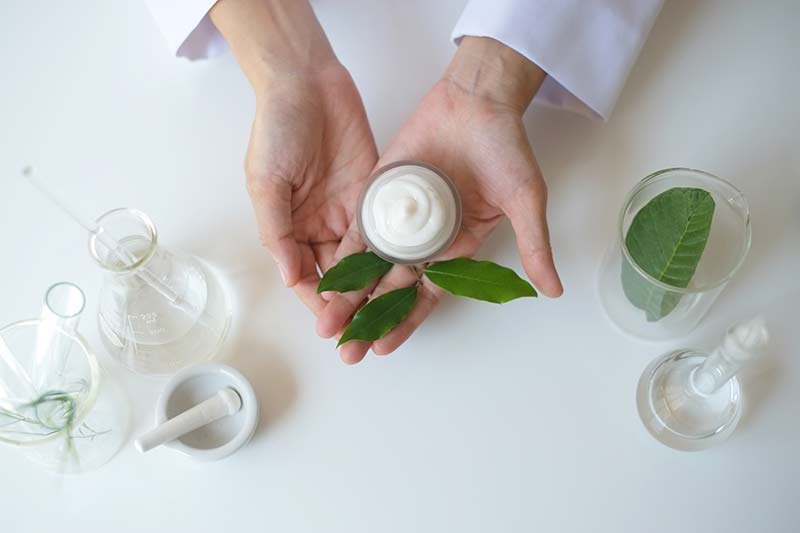
I believe this is an important point to make before you venture into switching your skincare: the difference between organic skincare and natural skincare.
Organic skincare refers to skincare that has been certified as organic. Brands that create organic skincare usually have strong ethos. I personally love Neal’s Yard Remedies products (aff link for their products here) which are generally organic but they do use preservatives that some people in the green beauty industry disagree with. So, they’re an organic brand (meaning they use a high percentage of organically grown certified ingredients and create certified skincare products) but this doesn’t mean all the ingredients they use are ethical in the eyes of some people. An example of one of these ingredients would be phenoxyethanol. Oh, then there’s the difference in countries in terms of organic certification. I go by European certification which is tough!
Natural skincare refers to skincare that uses ‘natural’ ingredients although not everyone means the same when they say ‘natural’ (refer to the above section for more on this). In a nutshell, a cream could contain a natural ingredient like Vitamin E which has been extracted in a laboratory which for many people is not ‘natural enough’ (as opposed to using a vegetable oil packed with vitamin E like pomegranate seed oil)although some could argue that this has also been extracted from the fruit) which then takes us to people who would say you need to pick the fruit fresh and use it as is. Each to their own – again, you need to define what ‘natural’ means to you.
**As you can see, you can have skincare with organic certification that is not that natural and extremely natural skincare that has not been certified as organic. Organic is a way of growing your crops while natural means ‘as close to nature as possible’.
Hope this clarifies the difference and I do encourage you to understand the terms well before making decisions as in what to buy and why.
A Note on People with Allergies (You Might Not Know You’re Allergic to a Particular Product)
Just to let you know that ‘natural’ does not mean ‘allergic-free’!!
In fact, very much the opposite. For example, MANY people are allergic to aloe vera even though you couldn’t get much more natural than slicing up an aloe vera leaf and rubbing it against your skin. Beware!
Natural Ingredients WORK
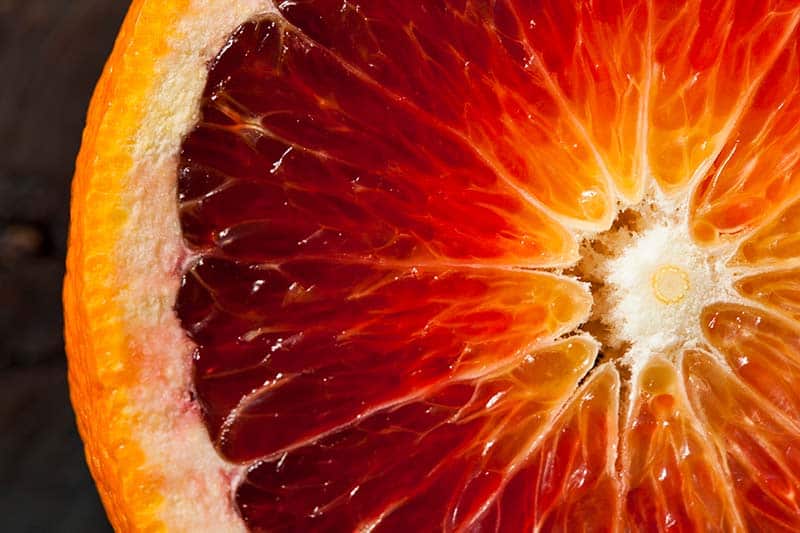
Yes, they do. Botanical ingredients (plant oils, hydrosols/hydrolats, butters, waxes, natural gums, etc) have powerful cosmetic properties and deliver therapeutic benefits to our skin.
Many plants, for example, produce incredible oils botanical oils when the seeds and fruits are pressed. These oils are composed of fatty acids that moisturise, nourish and soothe our skin. They can also help by providing the skin with elasticity. These oils also provide additional benefits with fabulous components like tocopherols, phytosterols, flavonoids, triglycerides, etc etc.
Mineral oils, on the other hand, are synthesised ingredients ant not metabolised by our body.
This is just one example and there’s so much more to this topic, I would have to dedicate an entire post around this which I might do in the future.
For now let’s just say that plants have powerful cosmetic properties and their extremely varied compounds deliver therapeutic benefits.
More & More Popular

Have you noticed how natural and organic skincare products are becoming more and more popular?
Formula Botanica stated on this article that the natural and organic beauty market will reach $54bn by 2027. Now, that’s pretty shocking in my view.
According to vox.com, “The “natural” beauty industry is on the rise because we’re scared of chemicals”. This is in part true, but there are other reasons why people are moving towards are more natural skincare lifestyle.
Apart from being ‘scared’ of chemicals (check cancer statistics here), there’s been a rise in sensitive skin caused by increased exposure to pollution, stress and digital aggressors, according to dermatologists (source). Skin sensitivity is in fact more of a buzz topic than anti-aging (60 to 70% of women and 50 to 60% of men have reported having some degree of sensitive skin – source).
We simply want to care for our skin with natural, honest ingredients.
An obsession with wellness and detoxification […] is fuelling a demand for stripped-back, ‘clean’ ingredients. […] As consumers continue to scrutinise what is in the products they put on their skin, zero-irritants will become the new standard of natural beauty.
Victoria Buchanan, The Future Laboratory
A couple of ingeresting facts:
- Clean beauty is actually a movement (check it here: #cleanbeauty)
- Harper’s Bazaar polled more than 1,000 U.S. women in 2019, and found that nearly 50% of women were already using clean beauty products and more than 60% of women were willing to try
In my (very personal) case, I went through a spiritual experience which mixed with the menopause led my body to reject anything that wasn’t natural. It was almost an overnight shock, where I literally had to stop all products I had been using til then (products I’d always been more than happy with, I must say) to find myself immersed in the world of natural skincare products.
In fact, my entire lifestyle changed. When I say overnight it doesn’t literally mean over one night, the process has taken years because there’s so much to learn and I changed EVERYTHING around the lifestyle I had back in London where I lived for almost 30 years. I moved to a peaceful area in the island of Tenerife, I’m learning to grow my own food, I’ve been making my own skincare for some time now and my spirituality has shot through the roof and I know it will continue to do so.
I don’t know what your personal circumstances are for wanting to switch to a more natural skincare lifestyle. If this is your case, you’ll probably find that you’ll want to go more natural in other areas of your life also. This is so good! If anything, I’m truly happy to be able to contribute to your change(s).
When Gwyneth Paltrow launched Goop by Juice Beauty in 2016, she told Vogue how vital it was that her line of beauty products—including a face cleanser, eye cream, and moisturizer — was all-natural. “The idea that you’re exercising and trying to eat well and then slathering yourself with chemicals, parabens, and silicones — it’s not great.” A few months later, she went on The Tonight Show to promote the line. She and host Jimmy Fallon dipped McDonald’s french fries into a pot of her moisturizer and ate it, presumably to show how pure it was.**
Source
The point is that you need to educate yourself on what sorts of ingredients you want to avoid and that way you can truly make informed purchasing decisions. ‘Natural’ and ‘clean’ will change in your concept as you change. You might now get started with a natural brand that doesn’t use aggressive preservatives and end up in 10 years time only using kitchen ingredients and making very basic skincare yourself.
Only time will tell. But, in my experience, you’ll grow inside with your changes.
**I’m not promoting Goop or any of the products since I haven’t checked ingredients list myself. My point revolves around people switching to a more natural skincare routine/lifestyle in general.
An Overall Sense of ‘Wellbeing’, a Lifestyle & a Catalyst for Many Other ‘Natural’ Changes in Your Life
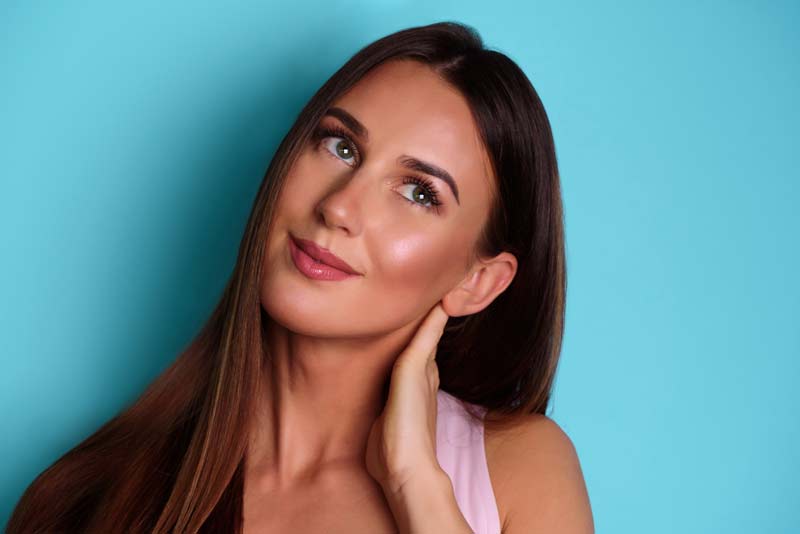
I mentioned this in the above section but I thought it deserves its own.
You might/might have not started switching to a more natural lifestyle in general and maybe skincare is your first step within a greater change (maybe you’ve changed many things in the way you live and skincare leans towards the end of your list) but either way a natural skincare regime/routine is part of a larger change in your life.
WHY You Should Switch to Natural Skincare Products
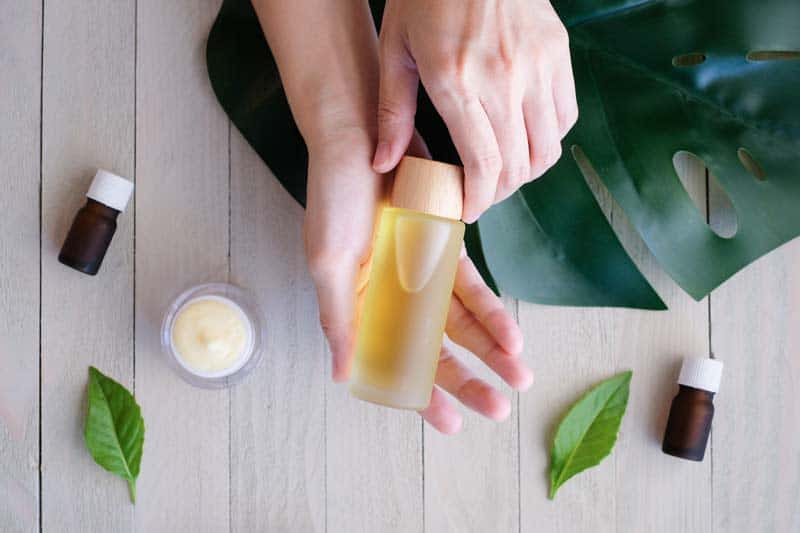
Let’s have a look below at the reasons why I think you should switch to natural and organic skincare products:
1. Natural ingredients are just as effective as conventional skincare
Green beauty IS effective. For example, research has shown that oils applied to the skin restore barrier function. Plants are now under close scrutiny in the scientific world and are being studied for their cosmetic properties. In fact, scientists are finding the compounds that have delivered plants’ therapeutic benefits for centuries. Plants DO offer incredible benefits to our skin.
2. You’re Responsible for Our Environment
Many natural and organic skincare brands are responsible when it comes to where they source their ingredients from. Planet sustainability s and ethical methods of extracting compounds and ingredients are nowadays the ‘norm’ for these brands.
3. Save Animals Lives
I’m not advocating you should use only vegan products (i.e., beeswax is not vegan) but brands that create beautiful organic and natural skincare lines will most probably make sure that no animal testing does EVER take place.
HOW You Can Switch to Natural Skincare Products
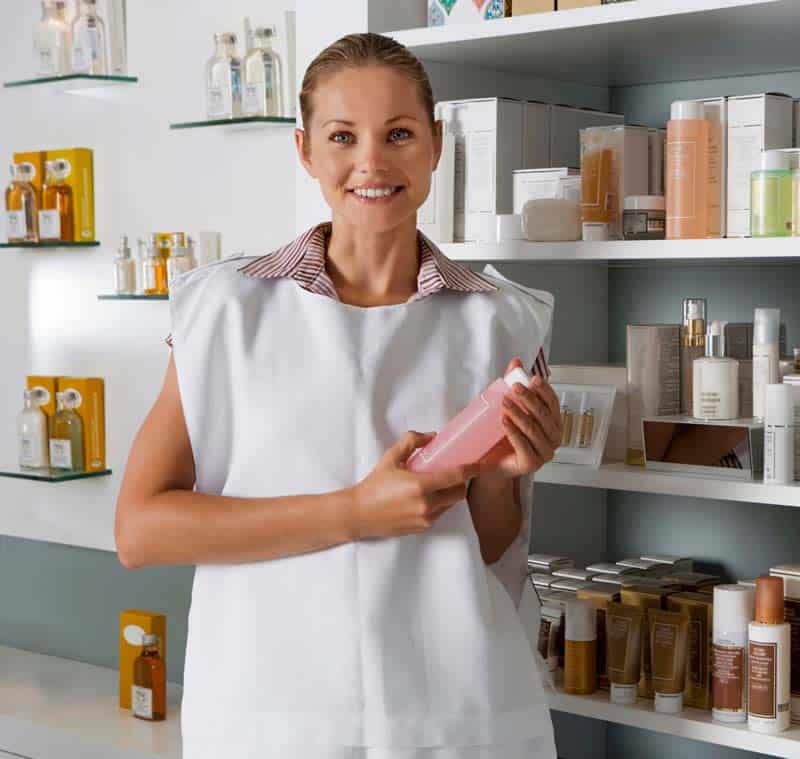
Not sure how to get started? Hopefully the list below will help you make the switch!
1. Do Your Research Thoroughly and DON’T Buy on Impulse
Visit Different Dedicated Stores
Go to a natural skincare store or health and beauty store or health and wellbeing dedicated store. Spend hours lost in the aisles checking the products. Smell them. Try the testers. See how you feel about them. Some of them will speak to you more than others. Trust your instinct!
Speak to Different Store Assistants
Go to different stores (at least 3) and speak to an assistant on each one. That will give you some perspective on how to proceed with your switch. Don’t be afraid to ask as many questions as you need. I went to 2 different stores many, many, many times before I started purchasing my first products. I felt confused but eager and I knew that I wanted to make the switch. When you feel this strongly about switching to natural products you eventually go for it so don’t hurry the process. Take your time. It will happen at some point so enjoy your research!
Online Research
This one is obviously a must but you have to be careful what you read and what to believe. Use your instincts and make sure to do quite a bit of research instead of just reading a couple of articles.
Research is important because it will get you to feel familiarised with the natural skincare world.
2. Start with a Brand You Know and/or Trust
Maybe a friend uses a brand you know and you’d like to get started using the same brand? (This doesn’t know you have to stick with them!). Or maybe you’ve been checking the Amazon natural beauty section and have liked the look of a particular brand? It is possible that someone recommends a particular product, that’s another way to get started. Again, see how you feel. And, again, you don’t have to stick with the first products you try.
3. Be Patient: How About Trying One Product at a Time?
Start by only switching one product at a time. The moisturiser is a good product to get started with. Maybe use the natural one every other day. See how they both feel. Once you get used to the ‘natural’ smell, there’s no going back. My body refuses anything that smells not-natural (I can’t describe the feeling or the smell, but, believe me, my body can tell!).
4. In the Meantime: Learn to Read (and Understand) the Label
This might be a little too much at first, but do get used to reading the ingredients with each and every product you hold in your hands. It can be a little overwhelming at first, but you’ll be familiar with the ingredients at some point. Here’s a great article by School of Natural Skincare on how to read a cosmetic label.
Re-Train Your Mind Regarding Packaging
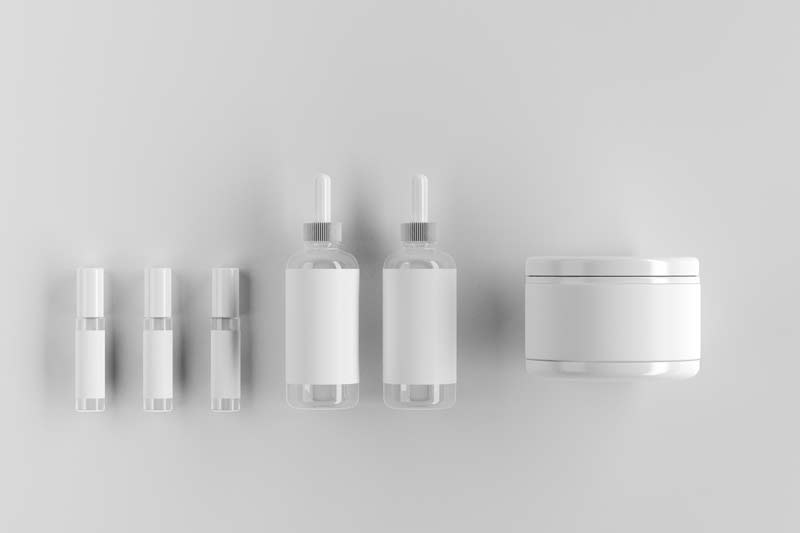
I’ve noticed in the natural cosmetics world less is more (yes, this is also marketing – marketing is important and we need to use it to our advantage).
Packaging will usually look either no-frills, very simplistic and/or have a really ‘friendly’ approach. Of course there’ll be exceptions but this will be the norm.
Ok, I’ve Switched, How Fast Will it Work?
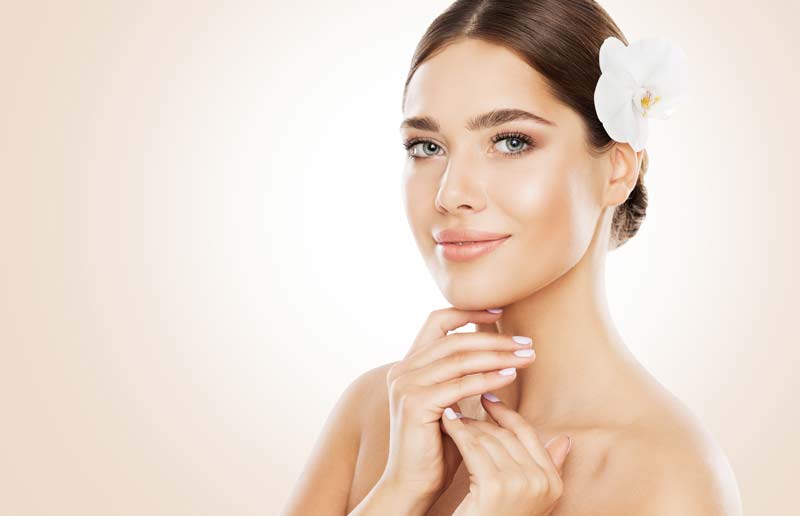
Remember when I mentioned about being patient?
Our skin renewal cycle is of 28 days and it takes longer as we age.
I can assure you natural products will make your skin feel GREAT over time. Your skin will totally love it and it can work wonders on skin that tends to get irritated, sore, red, etc. I used to have red patches above my eyebrows which I never get anymore. My skin looks illuminated most of the time and wonderfully soft as well as moisturised. So many benefits, I don’t really know where to get started!
If you’ve decided to make the switch – even if you’re only doing it with one product at first – make sure to give yourself at least 1 or 2 months to check if the product is making a visible difference.
For me, it was love at first scent. Once I smelled the natural products, I was hooked!
Helpful Links & Resources
BOTANI https://www.botani.com.au/7-reasons-why-switch-to-natural-skincare/
YOUTUBE https://www.youtube.com/watch?v=h56LAZ05PWM
MIND BODY GREEN https://www.mindbodygreen.com/0-17410/how-to-switch-to-natural-cosmetics-in-6-easy-steps.html
FORMULA BOTANICA https://formulabotanica.com/podcast-what-does-natural-skincare-mean/
FORMULA BOTANICA https://formulabotanica.com/global-organic-beauty-market-22bn-2024/
